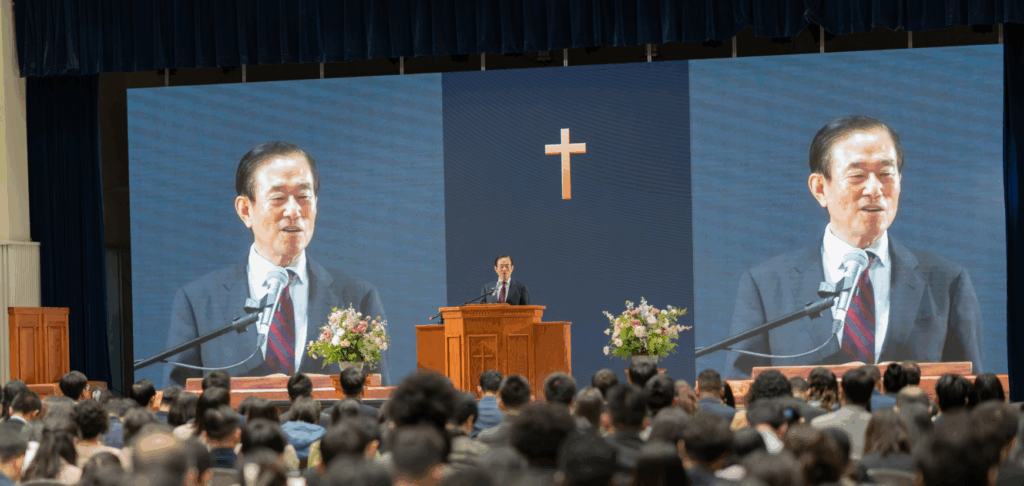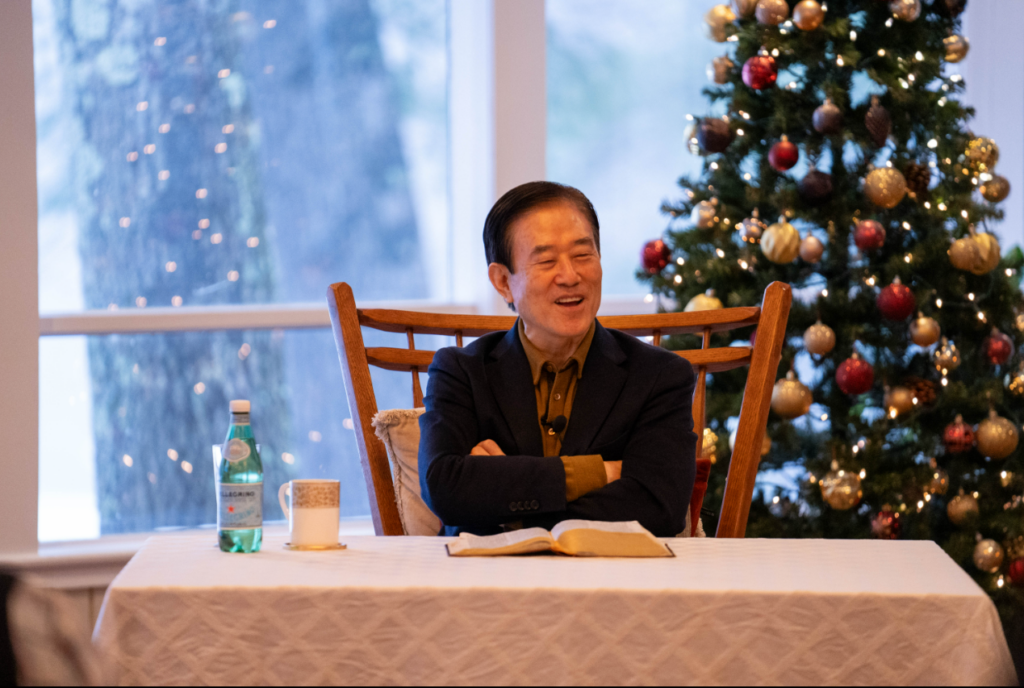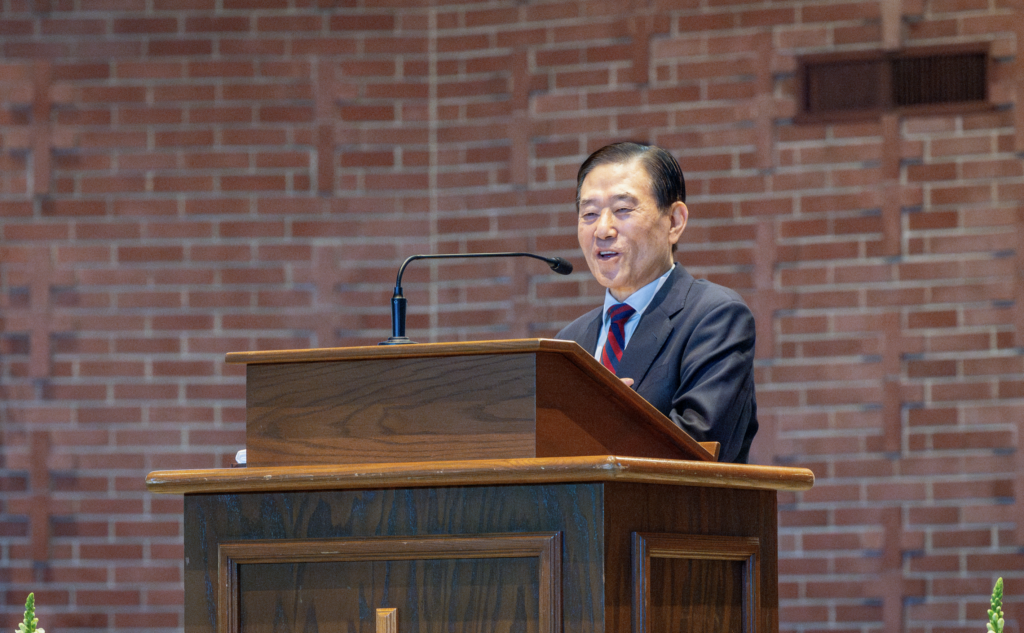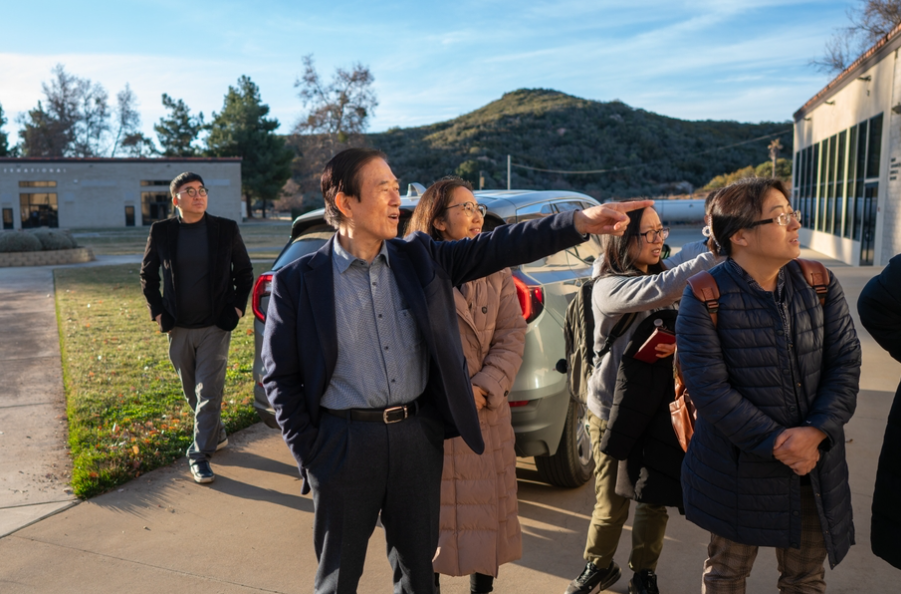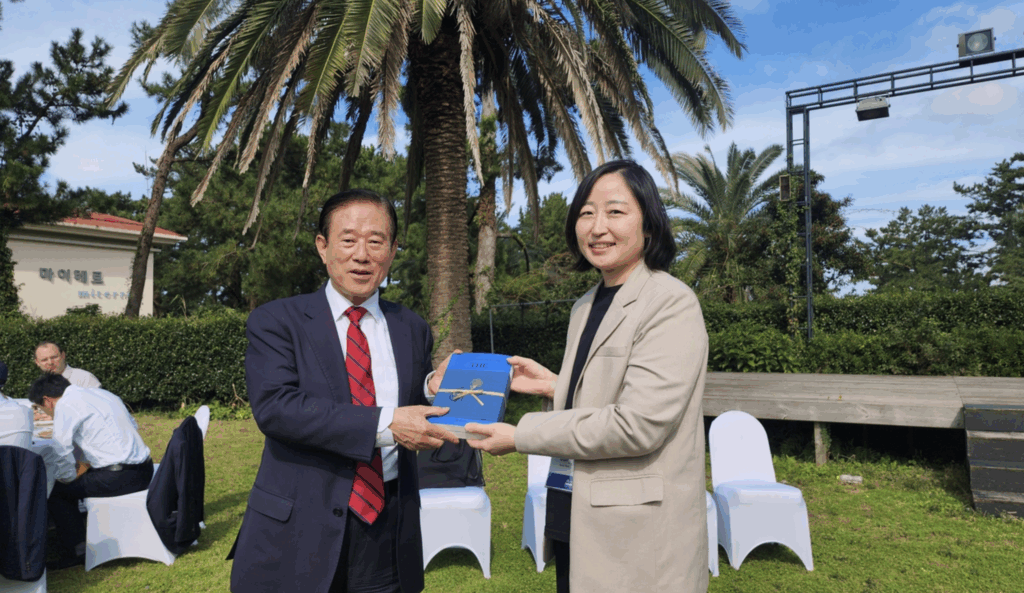
1. The Trials of Jacob and the Significance of the Hip Socket
Genesis 32:22–32, which recounts the story of Jacob, resonates deeply with believers. This passage depicts a grueling wrestling match that one must endure to become a true person of God and reveals the full meaning of “trial” and “test” that one comes to understand through that process. Pastor David Jang has preached on this text multiple times, emphasizing that Jacob’s journey is not merely an old story but a mirror reflecting “how each of us should stand before the Lord today.” The fact that Jacob wrestled so fiercely that his hip socket was dislocated, and that this ultimately led to reconciliation with his brother Esau, teaches us that the journey of faith is never easy. At the same time, it provides weighty guidance on how we should respond to the various temptations, tests, and trials we face in our own lives.
Jacob had purchased the birthright from his older brother Esau, causing severe conflict within the family. With strong backing from his mother Rebekah, he essentially stole the blessing that should have gone to Esau. Because of that, Jacob fled to his uncle Laban’s house to avoid Esau’s anger. Many years later, Jacob decides to return home with a large household and great flocks, but he remains gripped by fear that Esau’s rage is still alive. Despite amassing abundant wealth and having many children while away, he continued to carry the shadow of “hatred” and “resentment” in his heart. When Jacob stays alone that night at the ford of the Jabbok River, it is not merely because of physical fatigue or fear of meeting Esau. Rather, it is an urgent spiritual wrestling that arises from his desperate desire to truly “return everything” to his brother and cleanse himself of past guilt.
Pastor David Jang explains this scene by saying, “There is a ‘Peniel experience’ that every believer must undergo.” When we sincerely wish to come before God or desire reconciliation with a brother, God exposes even the deepest impurities hidden within us and permits a final “wrestling” that cleanses those impurities. In this passage, Jacob wrestles until daybreak with an angel of God (or a divine figure described as “a man”). The most dramatic moment of this trial occurs in verse 25, when “the man saw that he did not prevail against Jacob” and touched his hip socket.
In ancient times, the hip socket (often referred to in this context as the “thigh” or “hip joint”) could symbolize procreation, descendants, and the continuity of life. It was also the place where warriors would carry their swords, signifying strength and vitality. The dislocation of this hip joint, therefore, carries more than just a physical injury. It signifies that the person’s last stronghold—confidence, both physical and mental pride, or even the vital source of one’s life—is shaken. The paradox is that only when humanity’s strongest part is “broken” and “shattered” do we finally encounter the face of God (Peniel, literally meaning “face of God”). This truth goes to the core of our faith. Each of us clings to our own “hip socket” in some form, but by striking it, God reveals that “your own strength is not everything.”
Pastor David Jang has often interpreted in sermons that “Jacob’s limping from his injured hip socket symbolizes the renewal of his past.” In order for the path of reconciliation—which was impossible by human effort alone—to open, Jacob had to fight to the end, yet ultimately acknowledge that it was not by his own power. On this point, Pastor Jang frequently stresses, “When we become weak, when we are broken, that is when God’s work begins.” It may be a moment of profound pain and wounded pride from a human perspective, but it is simultaneously the moment of “transfiguration” before God. The Chinese phrase “換骨奪胎(hwan-gol-dal-tae)” literally means “the bones are changed (換骨), and the form is taken (奪胎),” generally referring to a total transformation for the better. In Jacob’s case, he receives the new name “Israel” through the painful dislocation of his hip socket. The history of Israel is built upon this renewed spirit—“loving one’s enemy, turning hatred into reconciliation, becoming a channel of blessing.” Pastor David Jang summarizes this point by saying, “A new spirit gives birth to a new people.” Jacob had to pass through this critical gateway before entering the land of Canaan.
Eventually, as dawn breaks, the angel says, “Let me go, for the day has broken” (Gen. 32:26). But Jacob refuses to let go unless he is blessed. Even with his hip socket out of joint, limping and clinging, he presents a truly strange sight. The angel asks Jacob for his name, and then bestows the blessing, “Your name shall no longer be called Jacob, but Israel” (v. 28). We then grasp why God transforms Jacob into a new being at such a dramatic moment. He had become someone who would “return all that he had” to his once hateful and vengeful brother Esau, and this is the beginning of the Bible’s message to “love your enemies.” This spirit is carried on completely in the teachings of Jesus, serving as a guide for countless believers.
Pastor David Jang emphasizes in particular that a mere “religious zeal” is insufficient to experience genuine Peniel. Religious duty or custom alone cannot bring us to the place where our “hip socket” is broken. Sometimes our pride—our spiritual achievements or the attitude “I’ve done so much for God”—acts as that “hip socket,” hindering God’s work. However, when we truly cry from within, “I cannot do this by my own strength. Lord, You must hold me. I want to reconcile with my brother,” that is when God gives us the new name “Israel” and causes us to stand as those “who have met the face of God.”
Reflecting on this passage can be enhanced by the aid of music or visual art. A gradually intensifying piece of classical string music, for instance, is ideal for imagining this nighttime scene. Bach’s “Cello Suite No. 1 in G Major, Prelude” starts quietly but grows grand, metaphorically paralleling Jacob’s internal struggle and desperate yearning. The guilt he carries, the longing to reconcile with Esau, and his relentless determination to receive God’s blessing all align with the music’s dynamic rise, creating a powerful resonance. As for artwork, one could look at Rembrandt’s painting “Jacob Wrestling with the Angel” (an actual masterpiece), which depicts Jacob wrestling with the divine figure in a dark setting. His limping posture and his folded hands in unceasing prayer are highlighted by the contrast of light and darkness, dramatically revealing human frailty and God’s absolute sovereignty.
In our life of faith, there inevitably comes a time to “wrestle with God, only to emerge as a new person after being broken.” Such a process is neither simple nor trivial. Yet Pastor David Jang continually underscores that this experience of Jacob is the believer’s true “morning of Peniel.” When hatred, fear, obstinacy, and arrogance within us crumble, and instead “the resolve to acknowledge my imperfection while clinging firmly to God” takes root, God transforms the limping steps of our broken hip into the path of Israel.
2. Jacob’s Reconciliation and the Benefits of Trials
Once Jacob wrestles to the point of receiving a new name, “Israel,” his life changes drastically. Though he already had a large family and abundant possessions, the most significant transformation in his heart was the “spirit of reconciliation.” He does not repay Esau’s hatred with hatred but steps forward and extends his hand. He sends all his wealth and blessings ahead of him as gifts to appease his brother’s anger and says to Esau, “I have seen your face, which is like seeing the face of God” (Gen. 33:10). What Jacob displays here goes beyond conventional notions of revenge or self-defense; he shows a higher plane of spiritual life.
Pastor David Jang observes, “In seeing how Jacob willingly gives up what he had gained—believing that it was originally Esau’s blessing—we can discover a gospel spirit that connects with the love of Jesus.” Although Christ’s teachings to “love your enemies” and to “turn the other cheek” appear as the completed gospel in New Testament times, the seeds of that teaching can also be seen in Jacob’s spirit of reconciliation. Just as Jacob became Israel and laid the foundation of a new people, so do we, in practicing reconciliation with others, open a “Peniel” moment for today.
True reconciliation rarely occurs from a position of surplus, where one might casually say, “I can afford to be generous.” Jacob limps on a dislocated hip socket as he approaches Esau. Only after his greatest strength is broken does he find the courage to meet his brother—not by his own power, but by God’s grace. This is precisely what Pastor David Jang, on numerous occasions, calls the “benefits believers gain through tests and trials.” When we become weak, we cling to God out of that weakness, and through that reliance we experience even greater spiritual power.
James 1:2–3 states, “Count it all joy, my brothers, when you meet trials of various kinds.” Pastor Jang explains this by saying, “When trials strike, instead of succumbing to fear or discouragement, we should ask, ‘How will God use this to transform me?’” Indeed, when we reflect on our church’s journey, it has gone through economic hardships, social persecution, and misunderstandings or criticisms from others. Each time, rather than falling into despair and scattering, the community held firm in prayer and looked to the Word, thereby finding new breakthroughs. This is Pastor David Jang’s testimony and also the direct experience of many believers.
The dramatic reconciliation between Jacob and Esau climaxes in Genesis 33. Esau runs to meet Jacob, embraces him, and they weep together. The heart of Esau, who once vowed to kill his brother, is now completely melted. While there might be various psychological or human explanations, the reconciliation is ultimately inexplicable apart from “Jacob’s earnest desire and God’s sovereign work.” Jacob offers his worldly wealth of 20 years to his brother, confessing, “This is the blessing God has given me, and I need you to accept it for my heart to be at peace.” Realizing Esau’s hatred partly stemmed from feeling he was robbed of his blessing, Jacob tries to heal that wound by restoring what had been taken.
Pastor David Jang refers to this scene as “a drama in which the fundamental conflict—Jacob received blessings but remained fearful, and Esau felt his blessing was stolen and thus was resentful—finally ends in reconciliation.” However, this drama is not completed merely by “Jacob sending gifts to Esau.” It had already been made possible because Jacob had been transformed inwardly at Peniel, receiving a new name, and, limping on his injured hip, still chose to approach his brother with love. In other words, only after Jacob’s pride and fear were broken in this trial, and his last ounce of strength was stripped away, could “the love of God” flow through him as a channel of blessing.
Similar conflicts abound in modern society—family feuds, disputes within churches, quarrels with neighbors, and even wars between nations. People often cling to their hurts, perceived losses, or sense of injustice, making reconciliation difficult. Yet just as Jacob approached Esau despite his shattered hip socket, we too need the “wrestling that requires laying down what we consider our final pride.” Through such a process, true reconciliation becomes possible, and in that moment we receive a “new name” from God.
Pastor David Jang says, “For our church community, which began in Korea and continues to spread the gospel in other nations, it is crucial to have a heart wide enough to reconcile even with ‘Esau’ after passing through Jacob’s trials.” The Korean church, having grown economically and gained social influence, has sometimes become arrogant and judged one another by worldly standards. This has led to many conflicts, mutual hatred, and jealousy. But ultimately, we learn from the Jacob–Esau narrative the true path God’s people must walk. It is a path of “generous giving, unrelenting pursuit of reconciliation, turning hatred into love, and confessing that all belongs to God.”
As we meditate on this scene of reconciliation, we can also draw inspiration from various artistic expressions. Tchaikovsky’s “Swan Lake,” for example, contains passages of lyrical melody that help evoke the image of two unlikely parties coming together and joining hands. While best known as a ballet, parts of its slow, poignant string sections can effectively depict the moment “hostility melts away, and hearts open to each other.” Imagining Jacob and Esau weeping in each other’s arms with such a soft, stirring melody in the background evokes profound peace and a sense of tender longing.
Visually, one might consider Gustave Doré’s 19th- and early 20th-century illustrations of Jacob’s story. Though Doré’s black-and-white, dramatic engraving style may differ from modern painting, his depictions of Jacob leading his household to meet Esau, and finally bowing low before his brother, vividly capture Jacob’s physical limp and the deep pathos within him. Jacob’s face seems to say, “Even if I die, I must reconcile with my brother,” challenging believers to ask, “What must I lay down for the sake of reconciliation?”
Jacob’s trial tested his faith and served as God’s instrument to fully turn him away from his earlier misguided choices or temptations. Without wrestling to the point of dislocating his hip, Jacob would never have become “the man of reconciliation,” nor would he have received the name “Israel.” When we face various hardships in life, we should not only see the negative aspects. Instead, we might ask, “Is God trying to give me a new name through this process?” and “What do I truly desire?”
Pastor David Jang often poses this question: “Do you truly desire to see the face of God and live reconciled with others, receiving a new name? Or do you still want to preserve ‘my blessing, my rights, and my pride’?” This is a challenging question for believers because, even in our life of faith, our goal sometimes remains “to receive greater blessings” or “to accumulate more possessions.” Yet as Jacob’s story shows, genuine blessing is found in “opening the way for reconciliation,” turning hatred to love, and ultimately breaking ourselves entirely so God’s work can be done.
Churches and faith communities today constantly face similar crossroads. Especially when we become economically prosperous and socially influential, the urgency and desperation that once drove us may fade, and arrogance can creep in. However, just as Jacob continued to limp even after reconciling with Esau, we must keep a lifelong reminder of the lesson we learned. Namely, we must never forget, “I was once broken and humbled in this trial.” If we fail to recall that desperate gratitude and faith by which we held fast to God, we risk falling again into pride.
When summing up his messages, Pastor David Jang frequently encourages believers to “carry forward the lessons of history.” The story of Jacob remains vivid after thousands of years because his descendants faithfully passed it down from generation to generation. Likewise, the trials, tests, and miraculous grace we experience in our own lives must be recorded and shared. Our children and future generations will read those records and learn from them.
Therefore, our task today is not just to become “those who wrestle with God and prevail,” like Jacob, but also to transmit that story so future generations may rediscover God through it. If we have received God’s blessing and become prosperous, then we must learn to boast in our lowliness; if we are poor, we must rejoice in being exalted in Christ (James 1:9–10). If a church has many members and ample finances, it should consider how it can share its abundance and serve the world. If it struggles under poverty, it can remain joyful by looking toward the greater patience and spiritual power that God cultivates through hardship. Just as Jacob, upon returning to his homeland, immediately sought Esau for reconciliation, we too must extend our hand first.
The nocturnal wrestling of Jacob in Genesis 32:22–32 offers a profound insight into the essence of faith. When the “hip socket of my strength” is broken and I limp, God’s work becomes perfect. Pastor David Jang calls this “Jacob’s hip socket being broken so that the morning of Peniel could finally dawn.” Indeed, Jacob leaves Peniel as the sun rises, no longer the man of fear but one of hope and reconciliation. Believers who learn this spiritual principle through “tests and trials” become unshakable in the world. Even if others wrong them, they remain determined to “envelop all in God’s love and strive for reconciliation.” Such an attitude inevitably touches the world, expands the gospel, and opens new paths for many.
In pictorial form, we might summarize this whole process as Jacob, though limping, running boldly toward Esau. The rising sun in the background sheds light on Jacob’s soul, which has overcome the long, dark night of wrestling. In our imagination, the music—like a softly starting classical string piece or a hymn of faith such as “Nearer, My God, to Thee”—plays gently, intensifying in resonance. Our hearts, following the limping Jacob, weep with him and share in the wonder of that dawn.
Jacob’s story does not end with his personal resolution. He becomes the father of twelve sons and the founding figure of the nation of Israel. Born from the “spirit of reconciliation,” Israel later forms the backdrop for the coming of Jesus Christ, the Savior of humanity. As Pastor David Jang repeatedly emphasizes, “peace, love, and sharing” are the fundamental identities of both Israel and the Church. Like Jacob, who nearly fell when his hip was broken but ultimately clung to God’s blessing, we too may stumble at times, but we must hold fast to the gospel of Jesus Christ and build one another up. When such life stories are passed down by the testimonies and writings of today’s believers, the next generation will inherit even richer accounts of God’s grace and will grow in faith.
Like Jacob, there are moments when we weep in pain and greet the new dawn of Peniel. Yet that dawn is the morning of beholding God’s face, forgiving our brothers, sharing the blessings we have received, and ultimately beginning a new history of resurrection. May we all set out boldly toward that radiant morning, and in doing so be reborn as “Israel,” those who “wrestle with God and prevail.” Though Pastor David Jang’s path of faith has not been easy, the abundant grace and miracles he has witnessed along the way bear testimony to the same message found in this text. Hence, Jacob’s story continues to offer unchanging comfort and challenge. Even if our own hip socket is broken and we limp, if we do not give up and continue onward, we will surely come face-to-face with God. And the stories of those who have seen His face will become a source of renewal for the Church for generations to come.


